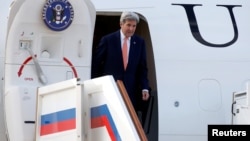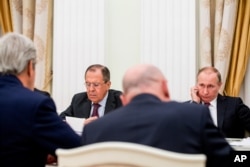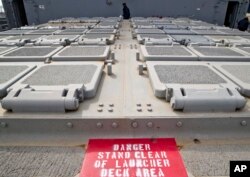John Kerry is visiting Moscow in an effort to secure Russian cooperation in anti-terror operations in Syria, despite a breakdown in U.S.-Russia relations over Ukraine, NATO and other issues that have left both sides simmering with distrust.
The secretary of state's two days of talks with the Russians are formally expected to touch on a wide range of issues; but, leaked reports first published by The Washington Post suggest the U.S. diplomat is offering Putin something dramatic: a U.S.-Russia military alliance against Islamic State, al-Qaida and other extremist groups in Syria.
Prior to departing for Moscow, Kerry declined to elaborate, but noted he would be meeting with Russian President Vladimir Putin as well as his Kremlin counterpart, Sergei Lavrov.
"We'll have plenty of time to talk about it," said Kerry.
Kremlin officials also offered few details.
"We expect that Kerry's visit to Russia ... will facilitate the improvement of the atmosphere in Russian-American relations, as maintaining global stability and solving a wide range of international issues depend on them," Russia's Foreign Ministry said Thursday.
Anti-terror alliance
The broad outlines of the leaked proposal, a so-called U.S.-Russian "Joint Implementation Group," amounts to synchronizing bombing operations against extremist groups in exchange for Russian pressure on Syrian leader Bashar al-Assad.
Thursday, White House spokesman Josh Earnest said the United States is not presently "conducting or coordinating military operations" with Russians in Syria. "It is not clear at this point whether or not we can reach an agreement to do that."
Washington has called on Moscow to force Assad to cease bombing moderate militant groups and civilian populations and, ultimately, agree to an exit from power.An estimated half a million people have died during the five-year Syrian civil war.
The U.S.-Russia deal, if implemented, would mark a significant turnaround in the U.S. position:
Since Russia's military intervention in the Syrian conflict last September, Washington has repeatedly accused the Kremlin of using its airpower to prop up the Assad regime, rather than Russia's stated goal of targeting terrorists.
That skepticism still exists. Just this week, U.S. officials accused Russia of bombing two rebel camps housing U.S.-backed rebels and their families; 135 people were reportedly killed in the attacks.
Diplomatic retaliation
Critics from both sides also point to the lingering diplomatic fallout of the Ukraine crisis, NATO exercises in member states along Russia's border, tit-for-tat diplomatic expulsions and other unfriendly gestures.
This week, Jeff Shell, chairman of the U.S. Broadcasting Board of Governors, which oversees Voice of America and other U.S. government-supported news outlets, was denied entry to Russia, despite a valid visa and passport. Russian officials later notified him he'd been "banned for life."
Yet Vladimir Frolov, a Russian foreign policy analyst with website Slon.ru, said despite the swirl of mutual suspicion, there might just be room for a deal on Syria.
"Moscow wants a political exit from the war," Frolov told VOA.
High costs
The Kremlin, he noted, is facing "diminishing returns" from its Syrian gambit, with rising costs in blood and treasure.Despite Putin's announcement last March that Russia had achieved its military objectives and would formally withdraw from Syria, Russian combat operations have continued.
So too, have casualties. Russia officially counts its dead at 12, including two Russian helicopter pilots shot down by IS militants in Syria last week. Outside experts suggest the numbers are significantly higher.
"The Kremlin knows that to defeat the insurgency would require a magnitude Russians have no stomach for," said Frolov.
"If casualties mount, it would be very hard to deny they're stuck," he said. "And they're stuck."













